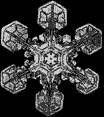|
|
|
|
Notes VII |
|
||||
|
a
rotting stump (with ears) |
Part
I Notes
I
|
|||||
|
|
||||||
|
maps...craquelure
anglaise |
||||||
|
|
||||||
| crystallist An amateur crystallographer. |
||||||
|
|
||||||
|
|
But
fragrant archivolts of evergreen For fir-needle archivolts decorating a Russian village, see Vladimir Nabokov's memoir, Speak, Memory, 1966, Chapter One. |
|
||||
|
|
||||||
|
|
Long
avenue ... roadside cottage to lakeside hotel There was a long avenue of oaks at Vyra, the Nabokov family's estate in St. Petersburg Province, that led to a motel in Delores, Colorado, and on to the Montreux Palace Hotel in Switzerland, overlooking Lake Geneva (free alp air). |
|
||||
|
|
||||||
|
|
Arabic
tangles ... Hebrew thorns Two beautiful alphabets: |
|
||||
|
|
||||||
|
|
Chinese
crystals ...
bright diagonal.
When
read diagonally in Chinese, the poem says "Li Peng step down, pacify the people's
anger." |
|
||||
|
|
||||||
|
|
liquid
shades/Variegated
like Antarctic streams
|
|
||||
|
|
||||||
|
|
Filed
pearl Mother of peril. Pearlescent pigments, iridescent figments, a phosphorescent glossary. |
|
||||
|
|
||||||
|
|
girl
I read about See lines 289-500 in Canto II of Pale Fire, a poem of 999 lines in heroic couplets by the American poet John Shade. The poem may be found in its entirety (along with an index, a commentary with useful notes, and a foreword) in Vladimir Nabokov's interesting novel Pale Fire (1962). |
|
||||
|
|
||||||
|
|
Platen
Lake Platen: a metal plate in a printing press that serves to position the paper and hold it against the inked type; the platen is usually large and of dark iron in old "platen presses" like the self-inking treadle platen press, designed in 1839 by American innovator Stephen Ruggles. |
|
||||
|
|
||||||
|
|
grimpen See the poem Pale Fire, line 368. Hazel Shade is reading one of the British poet T. S. Eliot's Four Quartets ("East Coker"), in which Eliot uses the word grimpen. His source is Arthur Conan Doyle. In Chapter Seven of The Hound of the Baskervilles, Mr. Stapleton of Merripit House, a naturalist carrying a butterfly net and specimen box, addresses Dr. Watson with a laugh: "'That is the great Grimpen Mire,' said he. 'A false step yonder means death to man or beast. Only yesterday I saw one of the moor ponies wander into it. He never came out. I saw his head for quite a long time craning out of the bog-hole, but it sucked him down at last. Even in dry seasons it is a danger to cross it, but after these autumn rains it is an awful place. And yet I can find my way to the very heart of it and return alive.'" Stapleton turns out to be the villain of the story. As Watson reports in Chapter 12, "All my unspoken instincts, my vague suspicions, suddenly took shape and centred upon the naturalist. In that impassive, colourless man, with his straw hat and his butterfly net, I seemed to see something terrible--a creature of infinite patience and craft, with a smiling face and a murderous heart." |
|
||||
|
|
||||||
|
|
(ALL
POWER TO...) See "The Twelve," a poem of black night and white snow written in January, 1918, by Alexander Alexandrovich Blok, 1880-1921. |
|
||||
|
|
||||||
|
|
a
film For an explanation and elaboration of the Russian term poshlust, see Vladimir Nabokov's Nikolai Gogol, chapter 3, "Our Mister Chichikov." |
|
||||
|
|
||||||
|
|
halfsilvered A mirror so engineered as to reflect approximately half of the particular photons that encounter it, while waving the other half through. Mentioned with relative frequency in the literature of 20th century physics. |
|
||||
|
|
||||||
|
|
her
life See note to line 370. |
|
||||
|
|
||||||
|
|
my
wife I happened to read the novel Pale Fire for the first time in late March of 1990, beginning it in New York city, continuing it on a jet over the Caribbean, and finishing it on a Jamaica beach. Back in New York, I reread it over the next month: it was the last novel I read before meeting Sophie Forrester, in May of that year. |
|
||||
|
|
||||||
 |
|
|||||
| Notes
VIII
|